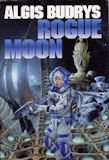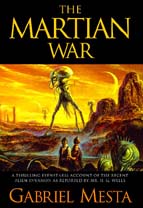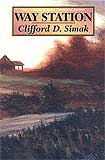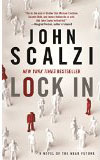
Rogue Moon, by Algis Budrys
Book Review by Paul Weiss
Pre-dating Arthur C Clarke's alien monolith in "2001: A Space Odyssey" by almost a decade, "Rogue Moon" tells of an equally bizarre alien construct on the moon called simply "the Formation". Dr Edward Hawks, a ruthless scientist is determined, at any cost, to plum the depths of the Formation and to puzzle out its origin and purpose, by sending a steady stream of hapless volunteers on a deadly one-way mission of exploration to the moon. Dr Hawks' recently built matter transmission device is capable of sending an exact duplicate of someone to the moon and into the Formation. The "original" of these intrepid explorers is held on earth in a type of stasis - a state of deep sensory deprivation - until the duplicate is killed in the maze inside the Formation. This frequently happens within minutes of their arrival on the moon. Although the nature of the process of matter duplication and transmission allows the original to share the experiences of his duplicate, the experience is so powerful as to drive every volunteer to hopeless insanity when they awake after the death of their doppelgänger.
Al Barker is an adventurer and utterly self-centered thrill-seeker - one might almost say, a sociopathic A-personality suicidally driven to ever greater heights of physical achievement regardless of the potential cost to himself and those around him. Hawks realizes that Barker may be the only person in the world with the physical strength and the ability to negotiate the intractable puzzles of the Formation combined with the mental strength to retain his sanity in the doing. Sure enough, a string of repeat missions ends in the death of Barker's duplicate but each trip finds him delving deeper and deeper into the mysterious path through the Formation. Likewise, against all odds, the original Barker remains sane and when he awakes, he is able to pass on the intelligence of his foray into the Formation to Hawks.
For this reader, it was a matter of some frustration to discover that even at the end of the story, the nature and purpose of the Formation remained undisclosed. While the hypothesized scientific nature of Hawks' matter-transmission device was discussed at considerable length, it became clear by the end of the novel that aliens, the Formation and science were not really the main themes of Budrys' "Rogue Moon" at all. The story was really an extended essay probing the nature of the ethics of scientific discovery and exploration. In addition, Budrys spent considerable effort talking about the philosophy of matter transmission and the possible meaning of a relationship between humanity and an alien species capable of creating a device like the Formation.
While much of this philosophical navel-gazing is delivered via stiff-necked dialogue between characters who would now seem very dated and out of place in this century, "Rogue Moon" does deserve kudos for having the courage to place theme over plot in a genre that is much better known for its guns ablaze space opera approach. I don't think I'd go quite so far as to call it the masterpiece that some have labeled it but "Rogue Moon" is worthy of a sci-fi fan's time and effort and deserves a place in any well-stocked library of classic science fiction.
Recommended.
Paul Weiss
|
Click here to buy Rogue Moon, by Algis Budrys on Amazon
|
Rogue Moon, by Algis Budrys on Amazon

| More Books You Might Like |
| Comments on Rogue Moon, by Algis Budrys |
| There are no comments on this book. |




